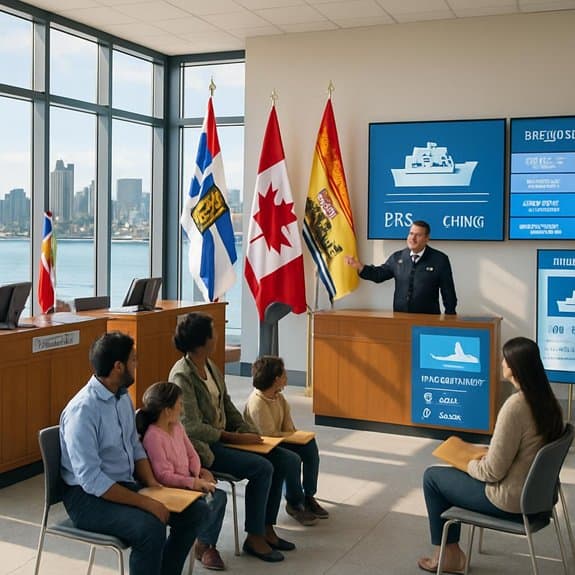
Canada’s Atlantic Immigration Program (AIP) has faced significant changes in 2025 due to federal allocation reductions. You’ll find that Prince Edward Island now restricts applications to healthcare, construction, and manufacturing sectors only. Nova Scotia prioritizes workers with expiring permits, while New Brunswick paused its AIP entirely after reaching capacity limits in April. Newfoundland and Labrador maintains the program but uses an invitation-based system for priority occupations. Understanding these provincial variations will help you navigate the current landscape more effectively.
2025 Federal Allocation Reductions Impact Atlantic Provinces
When the federal government reduced the 2025 allocation for the Atlantic Immigration Program, all four Atlantic provinces faced difficult decisions about which workers they’d prioritize for permanent residence.
Each province responded differently to these constraints. Prince Edward Island announced it would only accept endorsement applications for healthcare, construction, and manufacturing workers for the remainder of 2025.
Prince Edward Island restricted its program to only healthcare, construction, and manufacturing workers for the rest of 2025.
Nova Scotia prioritized foreign nationals already working in the province with expiring work permits, focusing on healthcare, social assistance, and construction sectors.
New Brunswick’s situation became most severe—the province completely paused its AIP in April after reaching its allocation limit.
Only Newfoundland and Labrador maintained operations while establishing priority processing for specific in-demand occupations across healthcare, technology, and aquaculture sectors.
Prince Edward Island’s Three Priority Sectors
Prince Edward Island’s response to the federal allocation cuts represents one of the most focused approaches among Atlantic provinces.
Due to high application volume and reduced federal allocation, PEI announced it’ll only accept AIP endorsement applications for workers in three prioritized sectors for the remainder of 2025.
The three priority sectors are healthcare, construction, and manufacturing. This means if you’re working in any other occupation, PEI won’t process your AIP endorsement application through the remainder of 2025.
However, you’re not completely out of options. Foreign nationals in other sectors can still submit Expressions of Interest through PEI’s Provincial Nominee Program. This provides an alternative pathway, though it operates under different requirements and processing timelines than the AIP.
Nova Scotia’s Focus on Current Work Permit Holders
While other Atlantic provinces implemented broad sectoral restrictions, Nova Scotia took a different approach by prioritizing foreign nationals who are already living and working in the province with work permits expiring in 2025.
This strategy focuses on retaining workers who’ve already established themselves in Nova Scotia’s communities and workforce.
You’ll receive priority processing if you’re currently working in healthcare and social assistance (NAICS 62) or construction (NAICS 23).
If you’re applying from outside Canada, Nova Scotia will prioritize your application only if you work in healthcare, social assistance, or construction sectors.
However, Nova Scotia maintains some flexibility by considering employers in trucking, science and technology, clean energy sectors, and resource development as exceptions to their general restrictions.
Newfoundland and Labrador’s In-Demand Occupation Lists
Unlike other Atlantic provinces that paused or heavily restricted their AIP programs, Newfoundland and Labrador maintained its program while establishing extensive lists of in-demand occupations that receive priority processing and exemptions from provincial labour market testing.
The province prioritizes three main sectors.
Healthcare occupations include physicians across multiple specialties, nurse practitioners, licensed practical nurses, personal care attendants, clinical psychologists, medical physicists, radiation therapists, and dosimetrists.
Healthcare professionals from physicians and nurse practitioners to medical physicists and radiation therapists receive priority processing under Newfoundland and Labrador’s AIP program.
Information and Communications Technology roles encompass software developers, biomedical engineers, AI developers, electrical engineers, security specialists, cloud specialists, bioinformaticians, and data analytics professionals.
Aquaculture positions cover captains with FM4 certification, farming managers, facility technicians, cage site technicians, and area managers.
Additionally, Newfoundland and Labrador implemented an Expression of Interest model effective February 19, 2025, requiring candidates to receive invitations before submitting AIP endorsement applications.
New Brunswick’s Program Pause and PNP Expansion
New Brunswick took the most restrictive approach among Atlantic provinces by completely pausing its AIP on April 4, 2025, after reaching its federal allocation for the year.
This pause means employers can’t become designated under the AIP, and designated employers can’t submit new endorsement applications for the remainder of 2025.
If you submitted an application on or before April 4, it’ll continue processing unless it’s in an occupation the province stopped processing as of February 20.
However, there’s positive news: New Brunswick received an additional 1,500 spots for its Provincial Nominee Program in June 2025.
You should explore individual PNP streams as alternatives if you’re interested in immigrating to New Brunswick through provincial pathways.
Atlantic Immigration Program Fundamentals
The Atlantic Immigration Program serves as a direct pathway to permanent residence for skilled workers and international graduates who want to build their lives in one of Canada’s four Atlantic provinces: New Brunswick, Nova Scotia, Prince Edward Island, and Newfoundland and Labrador.
This employer-driven program offers distinct advantages over traditional immigration routes. You’ll need a job offer from a designated employer and provincial endorsement, but there’s no requirement for a Labour Market Impact Assessment (LMIA).
Key program benefits include:
- Faster processing times compared to other permanent residence pathways
- LMIA-exempt work permits allowing you to start working while your PR application processes
- Individualized settlement services to help you and your family integrate successfully
The program connects you with designated settlement service providers who’ll create personalized integration plans for long-term success in Atlantic Canada.
Eligibility Requirements for Skilled Workers and Graduates
Before applying through the Atlantic Immigration Program, you’ll need to meet specific eligibility requirements that vary depending on whether you’re a skilled worker or an international graduate.
Skilled Workers must have at least 1,560 hours of work experience in the last five years in NOC TEER levels 0, 1, 2, 3, or 4 occupations.
International Student Graduates can qualify without work experience if they’ve completed a two-year credential from a recognized Atlantic Canadian institution, studied full-time throughout their program, lived in Atlantic Canada for at least 16 of the last 24 months, and maintained legal status during their stay.
Both categories must secure a job offer from a designated employer and obtain provincial endorsement before applying for permanent residence.
Work Experience and Education Criteria by TEER Level
Since your job offer’s TEER level determines both work experience and education requirements, understanding these criteria helps you prepare the right documentation for your AIP application.
Understanding your job offer’s TEER level is crucial for gathering the correct work experience and education documentation for your AIP application.
Work Experience Requirements:
- Skilled Workers: You need at least 1,560 hours of work experience in the last five years in NOC TEER 0, 1, 2, 3, or 4 occupations.
- International Student Graduates: You’re exempt from work experience if you have a two-year credential from a recognized Atlantic Canadian institution, maintained full-time student status, lived in Atlantic Canada for 16 of the last 24 months, and held legal status.
- Education Standards: TEER 0 or 1 positions require one-year post-secondary education or higher, while TEER 2, 3, or 4 positions need a high school diploma minimum.
Non-Canadian credentials require an Educational Credential Assessment.
Language Proficiency and Settlement Fund Requirements
While meeting work experience and education requirements establishes your professional qualifications, you’ll also need to demonstrate language proficiency and financial capacity to support yourself and your family in Atlantic Canada.
Your language requirements depend on your job’s TEER level. For TEER 0, 1, 2, and 3 positions, you must achieve CLB/NCLC 5. TEER 4 occupations require CLB/NCLC 4. You’ll need to take an approved language test to prove your proficiency.
Settlement funds vary based on your family size, ensuring you can financially support yourself upon arrival.
However, if you’re already living and working in Canada with a valid work permit, you’re exempt from demonstrating settlement funds. This exemption recognizes that you’re already established in the country.
Step-by-Step Application Process Through AIP
Once you’ve confirmed your eligibility and understand the language and financial requirements, you can begin the formal AIP application process.
Ready to take the next step? Confirm your eligibility first, then dive into the formal AIP application process.
The AIP follows a structured pathway that requires coordination between you, your employer, and provincial authorities:
- Secure Employment and Settlement Plan – Find a job with a designated employer in Atlantic Canada and work with them to obtain an individualized settlement plan through a designated settlement service provider.
- Obtain Provincial Endorsement – Your employer submits an endorsement application to the province on your behalf. If approved, you’ll receive a certificate of endorsement.
- Apply for Permanent Residence – Use your certificate of endorsement to apply directly to the federal government for permanent residence while potentially securing a temporary work permit to begin working immediately.
Employer Designation and Settlement Service Connections
The success of your AIP application hinges greatly on your employer’s designation status and their connection to settlement service providers. Employers must apply to their respective Atlantic province to become designated before they can hire through the AIP program. This designation process guarantees employers meet specific requirements and can support newcomers effectively.
Once designated, employers don’t need a Labour Market Impact Assessment (LMIA) to hire foreign nationals. However, they must connect accepted candidates with designated settlement service providers who conduct needs assessments and create individualized settlement plans for you and your family.
Your employer plays an essential role in supporting your long-term integration into Atlantic Canada. They’ll facilitate the settlement planning process and help you access temporary work permits, allowing you to begin working while your permanent residence application processes.
How Canadian Currents Immigration Services Can Help
Maneuvering through the Atlantic Immigration Program‘s complex requirements and recent provincial updates can feel overwhelming, especially when each province has implemented different priorities and restrictions for 2025.
Canadian Currents Immigration Services provides extensive support throughout your AIP journey. Our experienced team of immigration lawyers, consultants, and paralegals offers decades of combined expertise to navigate these challenging waters effectively.
We’ll help you by:
- Assessing your eligibility across all four Atlantic provinces to identify the best opportunities for your specific situation and occupation.
- Connecting you with designated employers in prioritized sectors like healthcare, construction, and manufacturing.
- Managing your application process from initial documentation through provincial endorsement and federal permanent residence submission.
Our tailored approach guarantees you receive cost-effective legal services designed to achieve ideal results for your immigration goals.

We serve ALL of Canada. Currently have offices Western Canada — Vancouver, Calgary, Edmonton, Kamloops and Red Deer. We also have the infrastructure to work with any of our clients virtually — even from the furthest regions of the Yukon to Newfoundland.
Call (778) 331-1164 [toll free 1 (844) 715-0940] to get routed to the best office for you or contact us online to schedule an appointment.
We also have a dedicated intake form to help you get the ball rolling. Our intake team will review your specific case and advise you on the next steps to take as well as what to expect moving forward.
Our offices are generally open 8:30 a.m.—4:30 p.m., Mon—Fri.


Aleksandra Koscielak
IMMIGRATION CONSULTANT
With an exceptional record of success in immigration consulting and business strategy, Aleksandra brings extensive expertise as a senior licensed immigration consultant. Her deep understanding of business strategies and processes enables her to advise executives on the best immigration solutions confidently.


